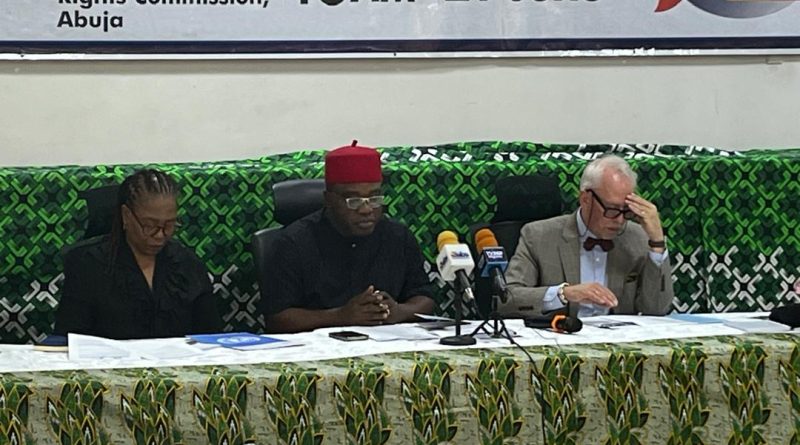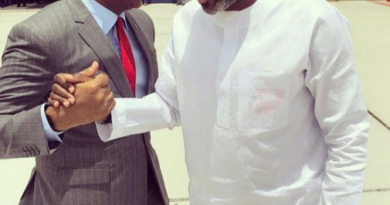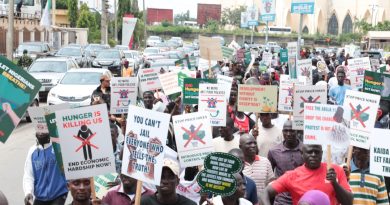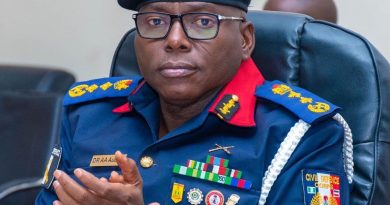NHRC Tells Youth, “Don’t Allow Yourselves Used As Canon Fodders To Deepen Hatred In Nigeria”
By Bukar BOLORI
The Executive Director of the National Human Rights Commission (NHRC), Dr. Tony Ojukwu has called on young people not to allow themselves to be used as ‘cannon fodders’ to incite and deepen hatred in Nigeria.
Speaking in Abuja at the special event to mark the 2024 International Day for Countering Hate Speech, Ojukwu said: “Sensitising and mobilising young people to combat hate speech is crucial in today’s world, where they are not only the target but also influential voices in their communities.”
He noted that young people who are more in Nigeria should guard against breaking the bond of the country and as such “should not allow themselves to be used as ‘cannon fodders’ to incite and deepen hatred in Nigeria.”
He added that: “Coincidentally, youths form the bedrock of our nation, and this demographic divide should at all times be mobilised for the social and economic development of our dear nation.”
He revealed that the NHRC working with the UN System in Nigeria, youth leaders and other stakeholders will use this commemorative event to create awareness, foster partnerships, and promote strategies to identify, address and counter hate speech.
He noted that: “This event which is jointly organised by the National Human Rights Commission and the United Nations in Nigeria in pursuance of their unique mandates to promote and protect human and in recognition of the roles of youth in nation building as well as serving as natural agents in the promotion of values etched in human rights in the spirit of Chapters 2 and 4 of the 1999 Constitution of Nigeria of the Federal Republic of Nigeria (as amended).”
Ojukwu said: “Hate speech is intricately related to human rights, either in its form or outcome. From the purveyor, it is about right to freedom of expression, opinion, speech or belief. To the recipient, it is a violation of the rights to dignity of human person and the freedom from discrimination based on religious belief, political, ethnic, gender, cultural or other affiliations, amongst many other human rights.
“Hate speeches promote discrimination, divisions, incites violence, all of which impedes voters’ participation and access in the elections.”
On his part, the United Nations Resident Coordinator, Mohamed Fall said the United Nations considers hate speech as any kind of communication in speech, writing or behaviour, that attacks or uses pejorative or discriminatory language with reference to a person or a group on the basis of who they are, in other words, based on their religion, ethnicity, nationality, race, colour, descent, gender or other identity factor.
Fall who was represented the Culture Programme Specialist, UNESCO Abuja Office, Mr. Philippe Delanghe said: “Hate speech contradicts all the values and principles enshrined in international human rights law. It also undermines efforts to achieve the aim of 2030 Agenda and its SDGs to leave no one behind, as it often targets the most vulnerable in our societies and minorities.”
He warned that: “If left unchecked, hate speech can harm peace and development, lay the ground for conflicts and tensions, undermine social cohesion, and contribute to wide scale human rights violations and atrocity crimes.”
He added that: “The devastating effect of hatred is not new. However, new technologies of communication has amplified the scale and impact of hate speech. Social media and the internet are now the most frequent methods for spreading divisive rhetoric and ideologies on a global scale.
“This brings me to the theme of this year, the power of youth to address and combat hate speech. Young people are often most affected by hate speech, particularly online as such young people must be part of the solution, your role in creating public and online spaces that are free from hate speech cannot be underestimated.
“The world must not tramp on freedom of speech and expression, but when speech is used to violate the rights of others it must not be met with silence. Silence implies apathy and even acceptance.”
He revealed that: “At the UN in Nigeria, we are working with multiple stakeholders to promote tolerance. UNESCO is leading the way through its efforts to promote Media and Information Literacy (MIL). We are also currently developing a UN wide Hate Speech Strategy. We count on your support in ensuring the strategy will be translated into effective action.”
He stated that: “As we celebrate a culture of tolerance today, I urge all of us including the government, traditional and faith leaders, civil society, young people, individuals, toincrease our efforts to counter hate speech in line with international human rights law.
“As the UN Secretary-General, Antonio Guterres, has said: “Hatred is a danger to everyone – and so fighting it must be a job for everyone.”




